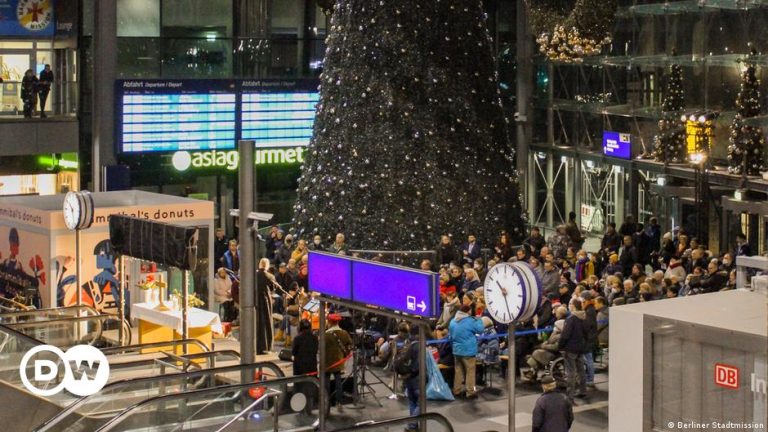The Berlin City Mission will organize a Christmas service in the center of the main room the capital’s central station on Sunday. During the Christmas Eve mass, which takes place for the 18th time since the main station opened in 2006, church bells ring through the loudspeaker system. The congregation sits on simple wooden pews; many people hold plastic bags containing all their belongings while they sing Christmas carols to hymn sheet music.
Pastor Christian Ceconi, director of the Berlin City Mission, will deliver Sunday’s sermon. Run by the Protestant Church, the non-profit association is the best-known provider of homeless projects in the German capital.

Ceconi drew a parallel between the birthplace of Jesus about 2,000 years ago and today. “There were no houses available in Bethlehem,” Ceconi said. “There was nowhere to stay. The shepherds from around the town were forced to move away.”
Ceconi said Mary, Joseph and the shepherds may have considered themselves insignificant and unimportant to anyone, but suddenly found themselves “at the center of world history.”
“A train station is always a place of transition, where people gather who otherwise would never meet,” Ceconi said. “And in the midst of all this, they encounter God, just like the shepherds of that time in Bethlehem.”
Ceconi said he saw “a totally different variety of people” when he looked at the congregation at the main station in 2022. “There were a lot of homeless people sitting there who I might also meet when getting off the S-Bahn in in the morning,” he said. Others present included travelers and employees of the national rail operator, Deutsche Bahn. “From the homeless to the railroad directors, I was also touched by this mix,” Ceconi said.
“Words of Peace”
Berlin’s main station is something of a temple of consumption 365 days a year, with its supermarkets and boutiques, shops and fast food restaurants. And then, on Christmas Eve, it becomes a cathedral for a good hour.
Unlike airports, large German train stations generally do not have religious spaces or chapels. And yet, the Berlin decor almost seems to have been designed for Christmas Eve: the wooden benches are next to a huge fir tree covered with thousands of LED lights. A wreath hangs in front of the huge glass facade and the escalators behind the simple altar at the center of the celebration remain motionless for the duration of the service. As worshipers sang on Christmas Eve 2022, double-decker trains from Western cities such as Cologne and Amsterdam arrived at platform 11.
Berlin’s main station is “a place of everyday life, of welcomes and farewells, of frustration and joy,” Monika Jung, director of Berlin’s long-distance rail stations, told DW. At Christmas, the building glows with festive light. “The magic of this special place is fully realized when songs and words of peace fill the room,” Jung said. Travelers and employees can “enjoy the present moment and forget that life in the station really never stops”.
Once the service is over, Berlin City Mission volunteers stack the wooden benches, remove the barriers, offer hot tea and tend to guests who may not yet have a place to spend the night. “To me, everyone sitting there is the shepherds,” Ceconi said. “After all, of all those who were present at the birth of Jesus Christ, the shepherds were probably the ones who least expected to appear in such a story. But, in the manger, their place was. And they could feel : God comes volume.”
Homeless people often live in the shadows of society, Ceconi said, “and if God wants to bring light into the darkness at Christmas, then he comes first to the people who are in the shadows of the Company”.
This article was originally written in German.
While you’re here: every Tuesday, the DW editorial team provides an update on German political and social news. You can sign up here to receive the weekly Berlin Briefing newsletter.


